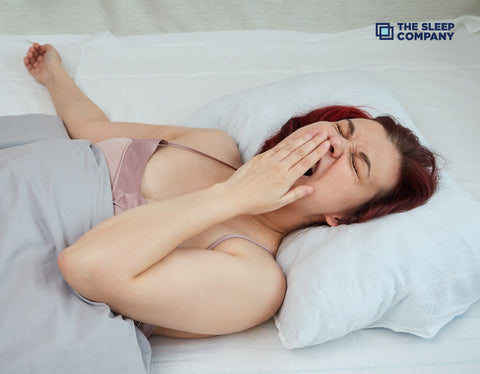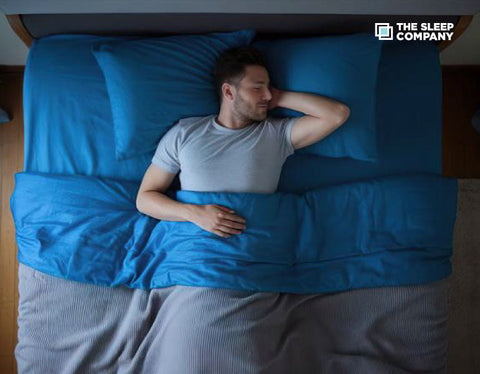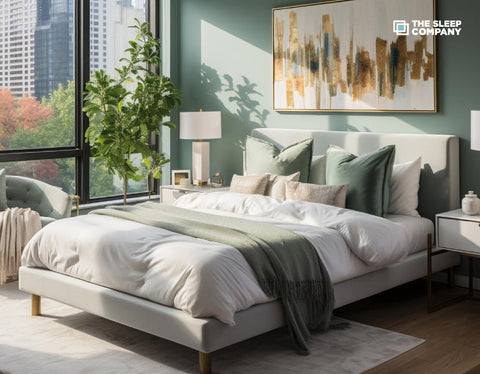My Cart

The Anxiety-Sleep Relationship

Anxiety and sleep are linked as one affects the other in such a manner that both have a negative impact on us, physically, cognitively, and psychologically. Excessive fear and worry prevent us from falling asleep, which further leads to sleep deprivation. Sleep deprivation worsens the anxiety, creating a loop of anxiety disorders and insomnia.
Studies have shown that anxiety disorders have become the common reason that is causing sleep deprivation amongst people. Thus, it is important to address the connection between anxiety and sleep for physical and emotional well-being.
What is Anxiety?

Anxiety is characterized by feelings of fear, panic, and discomfort. We all experience anxiety occasionally due to stressful or challenging events. On the other hand, anxiety becomes an issue when we feel these emotions excessively and regularly for six months or longer.
Anxiety disorders are classified into several categories: generalized anxiety disorder, panic disorder, obsessive-compulsive disorder (OCD), post-traumatic stress disorder (PTSD), and social anxiety disorder.
Not all illnesses exhibit the same symptoms or have the same impact on people. Furthermore, the actual source of anxiety is uncertain because it is caused by a combination of variables such as a person’s genes, family background, sensitivity to stressful life experiences, medical conditions, and medications.
Connections between Anxiety disorder and sleep
Researchers have proved the link between anxiety problems and alterations in a person’s sleep patterns. People who suffer from anxiety disorders have increased sleep sensitivity, which means they are significantly more prone to experience sleeping troubles under stress.
Insomnia and other serious sleep problems have long been known as prevalent signs of anxiety disorders. Anxious people frequently ponder about their issues in bed, and this anxiety might prevent them from falling asleep despite lying on the mattress for long enough. People with anxiety disorders such as GAD, OCD, and PTSD have also been diagnosed with sleeping issues.
Sleep anxiety, which enhances a person’s sense of fear and concern, might complicate matters. These unpleasant feelings about going to bed, which are a sort of predictive anxiety, can disrupt good sleep cycles and habits.
People with anxiety disorders frequently wake up in the middle of the night due to an anxiety attack, which causes their minds to produce additional concern and makes it difficult for them to sleep again. It can interrupt sleep, reducing their sleep quantity and quality. Sleep anxiety can cause nightmares and disrupt sleep. Nightmares may develop negative associations and terror connected with sleeping.
At the same time, sleep deprivation is known to influence mood and mental health, which may worsen the issues faced by anxiety disorders. Anxiety disorders can be triggered or worsened by a lack of sleep. Researchers discovered that those prone to anxiety are particularly vulnerable to the consequences of inadequate sleep, which can trigger anxiety symptoms.
How to Reduce Anxiety
While anxiety disorders can have devastating repercussions, they are controllable and curable. However, eliminating anxiety is difficult and involves treatment as well as adequate follow-up.
There are some ways to manage your anxiety, such as
1. Cognitive behaviour therapy (CBT)
CBT is a sort of cognitive therapy or talk therapy that teaches you how to change your thinking to change your behaviour. Cognitive behaviour therapy for insomnia (CBTI) is a kind of CBT that assists patients who suffer from sleeping issues caused by anxiety. The therapist guides you through this therapy to avoid behaviour patterns or external factors that trigger your anxiety or make sleeping difficult. Also, he helps you comprehend how sleep and anxiety affect your brain and the rest of your body and overcome negative or erroneous feelings about bedtime or sleep.
2. Healthy Sleep habits
Maintaining a healthy sleep habit or sleep hygiene is another remedy to help you fight against anxiety and sleeping problems. Try to follow sleep habits like
- Avoid alcohol, caffeine, and heavy meal before going to bed
- Don’t go to bed until you feel sleepy
- Regularize your sleep-wake time and follow it even on holidays
- Do meditation or other relaxing activities to help you fall asleep
- Avoid screen time at least 30 before going to bed
- Try to sleep in a comfortable environment.
Other than following sleeping habits, it’s important to have a comfortable sleeping area or room to reduce your anxiety level, such as:
- Find the causes that trigger your anxiety and remove them from your bedroom.
- Keep your bedroom properly ventilated as it helps alleviate breathing activity and doesn’t make you cramped or anxious.
- Use a comfortable mattress that does not give you other problems like body pains, which can disrupt your sleep. It is always better to buy mattress online which won’t hinder your sleep.
- Keep your bedroom dimly lit or completely dark as your body’s circadian clock reacts to brightness as a wake-up sign and darkness as a cue to sleep.
3 Medication
Your therapist may recommend using anti-anxiety medication to help you sleep better. Medication can also deal with the symptoms of sleep disorders such as restless legs syndrome and insomnia. Do not begin any anxiety or sleep medication without the guidance of your healthcare specialist.


































































